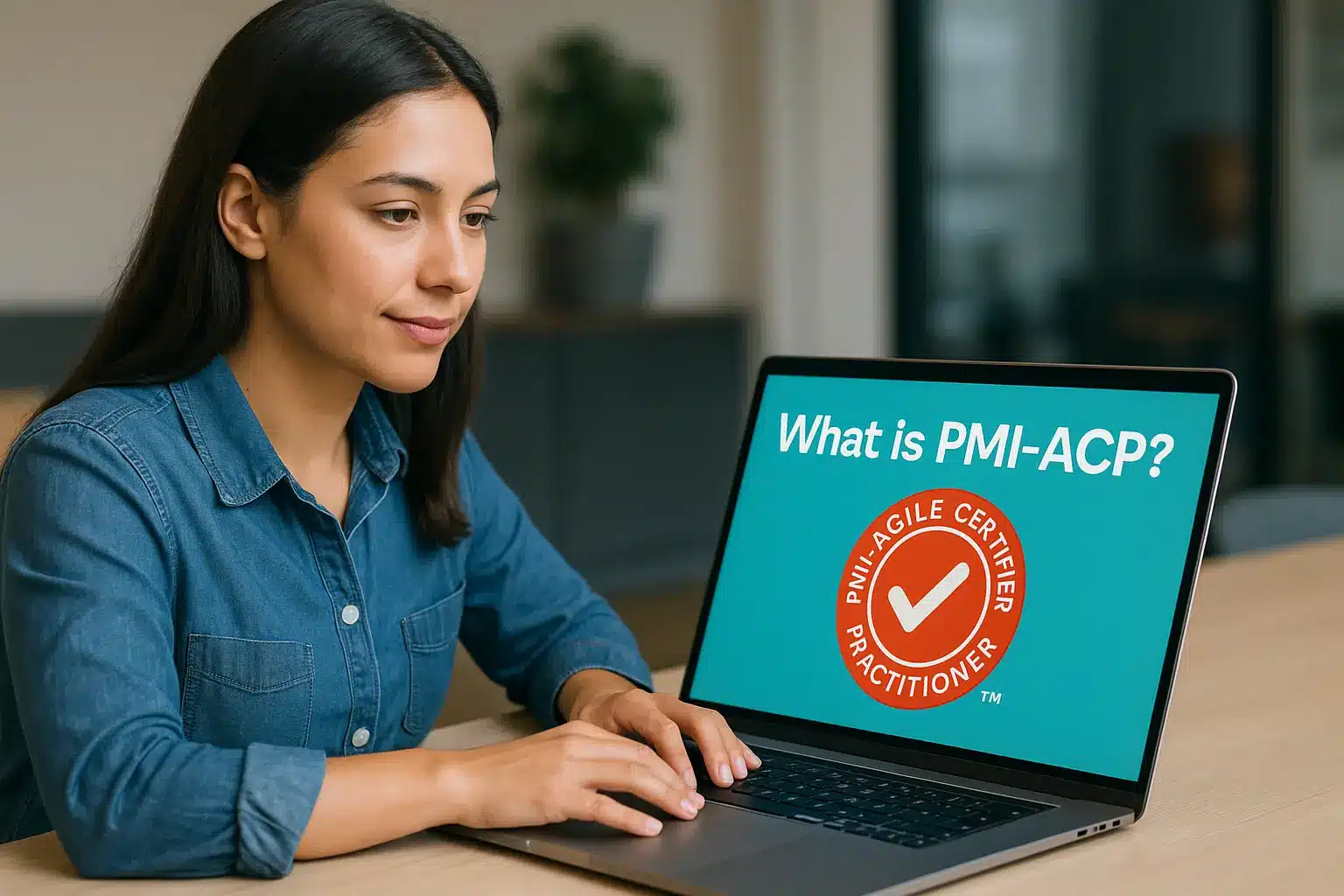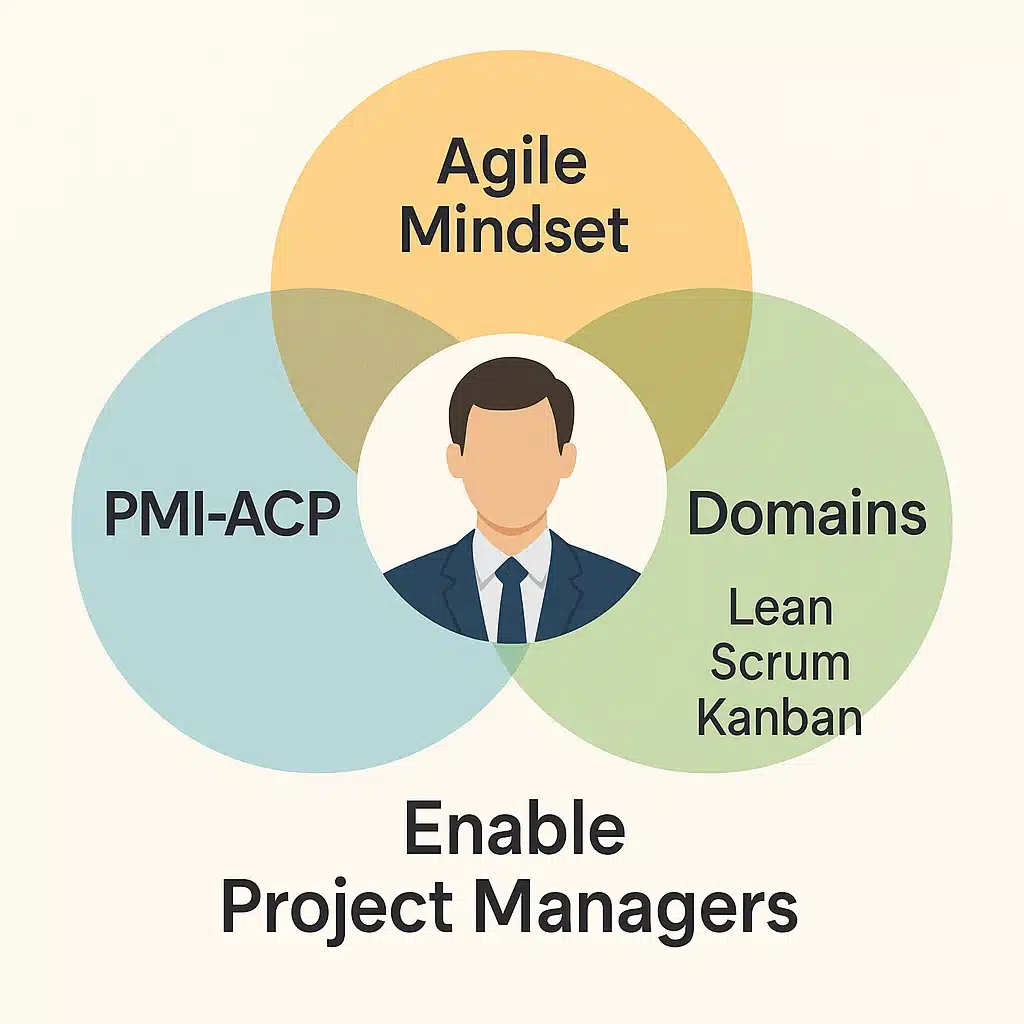Why The PMI-ACP® Certification Is the Agile Credential You Need Now
Author: Hajime Estanislao, PMP®; Editor: Geram Lompon; Reviewed by: Alvin Villanueva, PMP®, PMI-ACP®
You have delivered successful projects, managed teams, and hit every milestone, but the nature of project work is changing. Agile is no longer a specialty; it is the standard. As industries shift from static planning to iterative, value-focused delivery, in the realm of agile
That is where the PMI-ACP® certification comes in. Backed by the Project Management Institute, this credential reflects real-world agile project experience. Unlike role-specific designations, the PMI-ACP exam combines multiple agile methodologies like Scrum, Lean, Kanban, and Extreme Programming. It prepares you to follow agile processes and lead teams that deliver outcomes under pressure.
Picture yourself as the go-to person for Agile initiatives: you guide diverse teams, manage shifting priorities, and keep your stakeholders engaged. The PMI-ACP® credential is your signal to employers that you understand agile principles, agile methods, and how to translate them into meaningful results. Whether leading a Scrum team or facilitating a hybrid project, the ACP certification supports where you are and where you are headed.
Getting started is straightforward: review the eligibility requirements for the PMI-ACP® certification, prepare with trusted training materials and practice exams, and apply via the official PMI website. You will need a secondary degree, documented agile project experience, and 21 hours of agile training. Once approved, schedule your computer-based test through Pearson VUE and track progress in PMI’s online system.
Whether studying through online courses, joining study groups, or using an exam simulator, as you explore various study materials, you are not just preparing to pass but preparing to lead. The PMI-ACP is your opportunity to turn proven experience into certified expertise.

What is the PMI-Agile Certified Practitioner
The PMI-ACP (Agile Certified Practitioner) is a globally respected credential designed to validate your knowledge of agile principles, practices, and delivery frameworks. It references PMI’s most current exam content outline, covering four core domains: Agile Mindset, Leadership, Product, and Delivery.
The exam tests both theory and practice, from understanding agile roles such as the product owner, to applying adaptive planning across fast-moving projects. Candidates must show fluency in agile frameworks and the ability to solve real-world challenges across teams and sectors.
Unlike narrow-focus certifications, PMI-ACP is for professionals who already use agile techniques and want to demonstrate their readiness for broader responsibilities. It is designed not to start your agile journey, but to formalize it.
Reasons Why the PMI-ACP Is Your Next Skill
In the modern project world, it is not enough to be agile-aware; you need to lead with agility. The PMI-ACP credential bridges theory and practice; your knowledge is now applicable and visible.
-
Validates practical experience in agile environments
-
Covers multiple frameworks, including Scrum, Kanban, Lean, and XP
-
Prepares you to lead dynamic teams in complex conditions
-
Bridges traditional project structures with adaptive agile approaches
-
Supports future-proof skills across strategy, leadership, and delivery
-
Elevates your profile with employers and peers
-
Enables cross-industry mobility
-
Enhances your planning, estimation, and delivery practices
-
Reinforces continuous improvement and stakeholder value
-
Recognized by agile-forward organizations globally
From applying through the PMI website to scheduling your exam via Pearson VUE, each step of the journey is designed to mirror real agile workflows. You’re not just preparing for an exam; you’re refining your professional approach.

Understanding Your Path to PMI-ACP
To sit for the PMI-ACP exam, you need to meet PMI’s clear eligibility criteria:
-
Education requirement: A secondary degree (high school diploma or equivalent)
-
General Project Experience: 2,000 hours (12 months) in any project setting within the last 5 years. Already have a PMP® or PgMP® certification? This requirement is automatically waived. PMI accepts your credentials as proof that you’ve already met the general project experience requirement.
-
Agile Project Experience : 1,500 hours (8 months) applying agile practices in the previous 3 years of experience
-
Agile Training: 21 contact hours through eligible PMI-ACP courses, online training, or instructor-led programs
Documenting this in the PMI-ACP application is straightforward, provided you keep your project roles, training history, eligibility period, and timeframes organized. Once approved, you will receive an eligibility ID to schedule your exam through Pearson VUE, either in person or online.
Meeting these requirements is not just a gate to the exam, but it also affirms that you are already functioning as an agile practitioner. The certification confirms it.

General Project Experience and PMI-ACP
Your general project experience lays the groundwork for agile success. It demonstrates your understanding of planning, execution, delivery, and stakeholder communication, skills that remain essential in agile contexts.
If your background is in traditional
Scrum Master Role and PMI-ACP
If you are a Scrum Master, you are already applying key agile techniques, such as removing blockers, facilitating events, and encouraging team improvement. The PMI-ACP credential extends that capability beyond Scrum.
You will gain formal knowledge of multiple frameworks and deeper skills in risk management, adaptive planning, and collaborative delivery. It enables you to be a flexible, cross-method leader, ready for hybrid teams and enterprise-scale initiatives.
Application Process for PMI-ACP
The application process is simple:
-
Confirm Eligibility – Match your experience and training to PMI’s stated requirements.
-
Prepare Documentation – Outline your experience and gather proof of your contact hours.
-
Submit Your Application – Use the online system on the PMI website.
-
Application Review – PMI reviews submissions and requests clarification if needed.
-
Receive Eligibility ID – Once approved, use this to schedule your test.
-
Schedule Your Exam – Book through the Pearson VUE website, either in-person or remotely.

Step-by-Step Instructions for Creating a Study Map for Your PMI-ACP Certification
Define Your Exam Horizon
Choose a test date and calculate your weekly study hours. Additionally, include practice tests to establish a realistic pace, allowing you to maintain momentum and avoid burnout.
Break Down the Agile Terrain
Organize your study plan by the four domains:
-
Agile Mindset
-
Agile Product
Assign blocks of time to each area based on complexity and your current confidence level.
Build a Resource Stack
Use a variety of formats to reinforce your learning:
-
PMI-ACP Handbook
-
Exam Content Outline (Nov 2024)
-
Agile Practice Guide
-
Prep books and flashcards
-
Online courses with 21+ contact hours
-
Practice exams and exam simulators
-
Online forums and study groups
Practice What You Learn
Integrate scenario-based questions and simulations into your routine. As you prepare, incorporate test questions and begin full-length mock exams around Week 6 to test pacing and retention.
Close the Gap with Review Weeks
In your final 2–3 weeks, shift from learning to reinforcing:
-
Review weak topics
-
Take timed, full-length exams
-
Refine your recall of key terms and agile concepts

Considerations for Learning Agile Concepts and Applying Them in Practice
Agile is more than a methodology; it is a mindset. To apply it effectively, make space for learning, experimentation, and unlearning. Agile favors flexibility, collaboration, and iteration over rigid structure. If you come from a traditional background, allow yourself to recalibrate.
Observe how Agile principles affect real projects. Lead stand-ups with project teams, shadow sprint planning, and join online forums where practitioners share insights. By seeing Agile in action, you will translate theory into habits, and those habits prepare you for both the PMI-ACP exam and daily leadership.
How the PMI-ACP, Agile Mindset, and Domains Enable Project Managers
The PMI-ACP helps you evolve from project planner to agile leader. The four domains will give you a toolkit: the mindset to shift thinking, the leadership to enable teams, the product sense to prioritize value, and the delivery discipline to execute effectively.
You will learn to build adaptive plans, lead with transparency, and iterate with purpose. These are not exam topics; they are future-ready leadership skills in strategy, systems thinking, and human-centered design.

Wrapping Up: PMI-ACP with Rosemet LLC
The PMI-ACP is more than an exam, but a commitment to meaningful change in how you lead, think, and deliver. The certification not only prepares you with exam questions, but it also sets a standard for continuous growth in Agile capability.
At Rosemet LLC, we help project professionals navigate this journey. From exam prep guides to customizable study templates, our resources move with you. Whether shifting from traditional
You do not have to go it alone. Let Rosemet LLC be your partner in agile certification and practice.
References:
Project Management Institute. (2021). Agile practice guide (2nd ed.). Project Management Institute.
Project Management Institute. (2021). A guide to the
Project Management Institute. (2024). PMI-ACP® exam content outline.
Project Management Institute. (2024). PMI-ACP® handbook.

